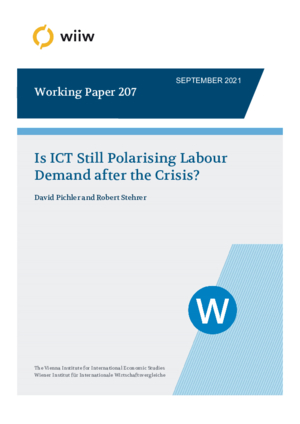Is ICT Still Polarising Labour Demand after the Crisis?
David Pichler and Robert Stehrer
wiiw Working Paper No. 207, September 2021
29 pages including 8 Tables and 4 Figures
The impact of ICT capital accumulation and digitisation on labour demand and wage structures has changed in recent years, according to some of the literature on the subject. We analyse the impact of ICT capital accumulation based on recent data differentiating between the period before and after the global financial crisis. Methodologically, we draw on Michaels, Natraj and van Reenen (2014) and are able to corroborate their findings for the period 1980-2004, whereas we find distinctly different patterns since 2011. Results suggest a negative relationship between changes in ICT intensity and the wage share for high-skilled workers, whereas medium-skilled workers were the main beneficiaries in sectors that experienced a more intensive digitisation process. These results are chiefly driven by the dynamics in the Central and Eastern European economies and the service industries. The effect of digitisation on low-skilled workers does not reveal any robust significant impact.
Keywords: ICT capital, skill polarisation, wage patterns
JEL classification: J31, O33
Countries covered: non specific
Research Areas: Labour, Migration and Income Distribution
